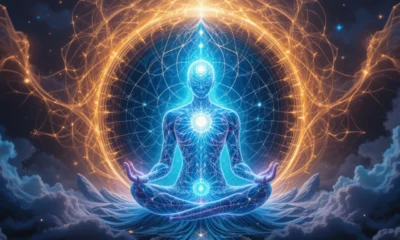Spiritual Meanings
What Does a Jaguar Tattoo Symbolize?

What Does a Jaguar Tattoo Symbolize?
A jaguar tattoo can be a powerful symbol for many individuals, representing various aspects of life ranging from spirituality and strength to cultural beliefs. This intricate design can capture the essence of the jaguar, a creature revered in numerous cultures, giving it profound meaning. Whether you’re considering getting a jaguar tattoo or just curious about its symbolism, this post offers insights into what this majestic animal embodies.
The Spiritual Meaning

In many cultures, the jaguar is a revered spirit animal, symbolizing power and protection. People believe that these magnificent creatures embody the spirit of the night, showcasing qualities such as agility, grace, and strength. In the realm of spirituality, a jaguar tattoo can signify one’s connection to the unknown or the mystical elements of life.
Owning a jaguar tattoo might reflect a person’s inner strength or the desire to embrace one’s wild side. It can signify one’s journey toward self-discovery, encouraging the bearer to dive deep into their spirit and seek authenticity. Additionally, the jaguar has a strong connection with instincts, suggesting that the wearer is in tune with their deeper feelings and emotions. This makes the jaguar tattoo a chosen emblem for those navigating transformative phases in their lives or who are eager to reconnect with their primal instincts.
The Biblical Meaning
Though the jaguar doesn’t appear explicitly in biblical texts, symbolic interpretations can be drawn from the attributes associated with the animal. The Bible often discusses animals to convey spiritual lessons or moral values. In this light, the jaguar’s ferocity and stealth can be interpreted as an embodiment of perseverance and determination.
Moreover, those who choose a jaguar tattoo may draw parallels between its hunting prowess and the ability to face adversity. In a spiritual sense, the jaguar encourages believers to overcome challenges and emerge stronger, akin to biblical figures who displayed unwavering faith in times of trials. Thus, while there may not be scriptural references to jaguars directly, their symbolism aligns with biblical teachings about strength, stealth, and faith.
Who Should Not Get This Type of Tattoo
While jaguar tattoos can be motivating and symbolically rich, they may not be suitable for everyone. It’s essential to consider your relationship with the symbolism of the jaguar before deciding to get inked. For example, if a person does not resonate with the traits associated with the jaguar, such as power, independence, or ferocity, they may want to consider alternative designs that reflect their personality more closely.

Moreover, individuals who are heavily influenced by a specific cultural or spiritual belief should approach the jaguar tattoo with caution. Since the jaguar has significant importance in various indigenous cultures, getting such a tattoo might be seen as cultural appropriation if the wearer doesn’t have a deep connection to or understanding of those cultures. It’s crucial to respect the significance of the animal and the cultural narratives tied to it.
Other Religious Interpretations
In various religions and belief systems, animals and their symbolic meanings serve as guides for human behavior and spirituality. The jaguar is particularly significant in Mesoamerican cultures, especially among the Maya and Aztecs. For the Maya, the jaguar symbolizes the underworld, strength, and the ability to navigate through dark and difficult situations. Thus, a jaguar tattoo can represent a willingness to embrace and transcend life’s challenges, making it a symbol of resilience.
In African traditions, the jaguar, while not commonly referenced, also exudes qualities of strength and stealth. Similarly, in Native American culture, the jaguar symbolizes courage, strength, and the ability to fly between different realms of existence. The variety of interpretations across cultures illustrates the universal appeal of the jaguar’s symbolism as it speaks to fundamental human experiences, like facing fears, navigating challenges, and embracing one’s true self.
Cover-Up Ideas If Things Went Wrong
Tattoo regrets can happen for numerous reasons, and if you find yourself needing to cover up a jaguar tattoo, there are several creative options. The first idea is to opt for a larger design that incorporates the jaguar into a different theme. For example, you could add elements like a jungle background, other animals, or flowers that create a more cohesive and beautiful piece. This way, you can transform the existing tattoo rather than completely erase it.

Another option is to play with patterns and abstract shapes that include the jaguar, giving it a new artistic flair. Geometric shapes, mandalas, or tribal designs can easily incorporate the original tattoo while creating a fresh perspective. Alternatively, consider a portrait or abstract representation that formats the jaguar into something more personal, symbolizing a life journey or evolution.
Popular Jaguar Tattoo Designs
The design of a jaguar tattoo can vary widely, giving people the freedom to express their individual ideas and feelings. One of the popular designs incorporates ornate tribal patterns intertwined with the jaguar, reflecting strength and connectivity to roots. Such designs serve not just as art but as a narrative about personal identity and cultural heritage.
Another appealing design is that of a roaring jaguar, symbolizing power and authority. This particular representation often features vivid colors to emphasize the majestic nature of the animal, making it a striking expression. Watercolor tattoos that feature jaguar motifs are also gaining popularity due to their artistic vibrancy and fluidity. These tattoos are often splashed with multiple colors, giving the design life and energy, thus making it a joyful and personal representation.
The Emotional Connection
One significant aspect of getting a jaguar tattoo is the emotional connection the individual may have with the animal. People often choose a jaguar tattoo because they admire the qualities it represents, such as determination, fearlessness, and independence. For many, the jaguar may reflect a key moment in their lives when they felt particularly brave or were at a crossroads, forcing them to make bold decisions.

Beyond realizing personal strengths, these tattoos can also serve as reminders of the bearer’s struggles and victories in life. This emotional connection can transform a simple piece of ink into a powerful talisman that supports the individual whenever they feel challenged or vulnerable, reminding them of their inherent strength and resilience.
Cultural Significance
The cultural significance of the jaguar cannot be understated. In many Central and South American cultures, jaguars are viewed as sacred beings. The ancient Maya referred to the jaguar as a powerful spirit animal, associated with the underworld and the afterlife. Their artwork often depicts the jaguar as a protector of the realm, instilling reverence and admiration.
This cultural connection makes the jaguar tattoo not only a personal symbol for many but also a representation of a rich history and tradition. When choosing a jaguar tattoo, individuals often delve into their heritage, discovering more about their lineage and connections to indigenous cultures that have revered the animal for millennia. It’s crucial to acknowledge and respect these cultural narratives when considering a jaguar tattoo.
Also read : What is the spiritual significance of the pope opening a portal with lucifer’s tomb
Conclusion
A jaguar tattoo can embody a wealth of meanings, from spiritual representation to deep cultural significance. Whether you’re drawn to the jaguar as a symbol of strength and resilience, or you appreciate its intricate beauty, this tattoo can be a powerful personal emblem. However, before getting a jaguar tattoo, it’s important to contemplate its meaning carefully, ensuring it resonates with who you are. Remember to respect the cultural implications and consider your personal connection to the animal. A well-thought-out tattoo can be a lifelong reminder of your strengths and journey, celebrating both your individual narrative and the traditions that inform it.
FAQs
1. Can I customize my jaguar tattoo design?
Yes, many tattoo artists encourage customization to reflect your personal style and the specific meanings that resonate with you. Collaborate with your artist to develop a unique design.
2. Is it common to associate jaguars with specific zodiac signs?
While there are no official astrology connections, some individuals link jaguars with zodiac signs like Scorpio or Leo due to their traits of passion, strength, and independence.
3. What are some popular locations for a jaguar tattoo?
Common locations include the arm, back, or thigh. Ultimately, the choice depends on your personal preference and visibility.
4. How can I ensure that the jaguar tattoo I choose is culturally appropriate?
Research the cultural significance of the jaguar in various traditions or consult with someone knowledgeable about indigenous cultures to ensure respect and understanding.
5. Can a jaguar tattoo change in meaning over time for the wearer?
Absolutely. As people grow and evolve, so can the meanings attached to their tattoos. The jaguar can take on new personal significance as you navigate different life experiences.
For a visual exploration of this topic, you may find the following video informative:
Spiritual Meanings
What is the spiritual significance of the common starling?

The spiritual significance of the common starling?
we will explore the spiritual significance of the common starling, a bird known for its striking appearance and behavior. We will delve into the symbolism and meanings associated with the common starling in various spiritual traditions and how it can serve as a powerful guide and messenger in our spiritual journey.
What is the spiritual significance of the common starling?
The common starling, also known as the European starling, holds deep spiritual significance in various cultures and belief systems. In many spiritual traditions, birds are considered to be messengers from the divine, bridging the gap between the earthly realm and the spiritual realm. The common starling, with its glossy black plumage and iridescent sheen, is often seen as a symbol of magic, mystery, and spiritual connection.

In Celtic mythology, the starling is associated with transformation and shape-shifting, symbolizing the ability to adapt to changing circumstances and embrace new beginnings. The starling’s murmurations, where thousands of birds move together in synchronized harmony, are seen as a powerful metaphor for unity, cooperation, and collective consciousness.
How can the common starling guide us on our spiritual journey?
For those who resonate with the spiritual significance of the common starling, the bird can serve as a guiding light on their spiritual path. The starling’s adaptability and resilience can inspire us to embrace change and transformation in our own lives, trusting in the divine guidance that is always present.
When we observe the starling’s murmurations, we are reminded of the power of unity and collective consciousness. We are encouraged to connect with others in a spirit of cooperation and harmony, recognizing that we are all interconnected and part of a larger whole. The starling can also remind us to trust in our intuition and inner wisdom, following the path that resonates with our true purpose and passion.
What are the symbolic meanings of the common starling in different spiritual traditions?
In Native American spirituality, the common starling is often seen as a symbol of communication and connection with the spirit world. The bird’s melodious songs and vocal mimicry are believed to carry messages from the ancestors and spirit guides, guiding and protecting the tribe.

In Chinese culture, the common starling is associated with good luck and prosperity. The bird’s ability to mimic sounds is seen as a sign of intelligence and adaptability, qualities that are highly valued in Chinese philosophy and folklore.
In Hinduism, the common starling is considered to be a sacred messenger from the gods, carrying blessings and divine guidance to those who are open to receiving them. The bird’s graceful flight and melodious songs are seen as manifestations of the divine presence in the natural world.
How can we connect with the spiritual energy of the common starling?
To connect with the spiritual energy of the common starling, we can spend time in nature, observing the bird in its natural habitat and listening to its songs. We can also meditate on the symbolism and meanings associated with the common starling, reflecting on how it resonates with our own spiritual journey.
Creating artwork or crafts inspired by the common starling can also help us connect with its energy and wisdom. By incorporating the bird’s symbolism into our daily lives, we can invite its guidance and protection into our hearts and homes, fostering a deeper connection with the spiritual realm.
What does it mean if a common starling crosses your path?
Seeing a common starling cross your path can be a powerful omen or message from the universe. In many spiritual traditions, birds are seen as messengers from the divine, bringing guidance and blessings to those who are open to receiving them. If a common starling crosses your path, it may be a sign that you are being called to embrace change and transformation in your life, trusting in the divine guidance that is always present.

Pay attention to any thoughts or feelings that arise when you encounter a common starling, as they may hold valuable insights and messages for you on your spiritual journey. Take the time to connect with the bird’s energy and symbolism, allowing it to guide you towards greater clarity, purpose, and spiritual growth.
Also read : The Spiritual Significance of October in the Bible
Conclusion
In conclusion, the common starling carries deep spiritual significance in various cultures and belief systems, symbolizing transformation, unity, and divine guidance. By connecting with the energy and symbolism of the common starling, we can tap into its wisdom and power, guiding us on our spiritual journey towards greater self-awareness and connection with the divine.
FAQs
1. Can the common starling bring good luck?
Yes, in Chinese culture, the common starling is associated with good luck and prosperity due to its intelligence and adaptability.
2. How can I connect with the spiritual energy of the common starling?
To connect with the spiritual energy of the common starling, spend time in nature observing the bird, meditate on its symbolism, and create artwork inspired by the bird.
3. What does it mean if a common starling crosses my path?
Seeing a common starling cross your path may be a sign of change and transformation in your life, urging you to trust in divine guidance.
4. How can the common starling guide me on my spiritual journey?
The common starling can guide you by inspiring adaptability, unity, and connection with the divine, encouraging you to embrace change and trust your intuition.
5. Are there any specific rituals or practices associated with the common starling in spirituality?
While there are no specific rituals or practices associated with the common starling, you can incorporate the bird’s symbolism into your daily life through meditation, observation, and creative expression to connect with its spiritual energy.
Spiritual Meanings
The Spiritual Significance of October in the Bible

The Spiritual Significance of October in the Bible
This article explores the spiritual significance of October in the Bible, highlighting the symbolism and meaning behind this autumn month.
What does the month of October symbolize in the Bible?
In the Bible, the month of October carries with it themes of harvest, abundance, and preparation. As the autumn season sets in, October represents a time of reaping the rewards of hard work and sowing seeds for the future. It is a time to reflect on God’s abundance and blessings in our lives, as well as a time to prepare for the colder months ahead. The changing colors of the leaves and the crisp fall air remind us of the beauty of God’s creation and the cycle of life.

Throughout the Bible, the number eight is often associated with new beginnings and regeneration. October is the tenth month of the year, which adds up to the number one, symbolizing unity and God’s sovereignty. This month serves as a reminder that God is in control of all things and that we can trust in His timing and provision.
How can we embrace the spiritual significance of October in our lives?
One way to embrace the spiritual significance of October is to take time to reflect on the blessings in our lives and give thanks to God for His provision. This can be done through prayer, meditation, and acts of service to others. October is also a time to prepare our hearts and minds for the season ahead, seeking God’s guidance and wisdom as we navigate the challenges and opportunities that come our way.
Embracing the symbolism of harvest and abundance can inspire us to be generous and share our blessings with others. Whether it’s through giving to those in need, volunteering in our communities, or simply expressing gratitude to those around us, we can embody the spirit of October and spread God’s love to those in our midst.
What are some key Biblical references to October?
While the specific month of October may not be mentioned in the Bible, there are several passages that speak to the themes of harvest, abundance, and preparation that are associated with this time of year. In Genesis 8:22, God promises the cycle of seedtime and harvest will continue as long as the earth endures, reminding us of the importance of sowing seeds of faith and reaping the rewards of God’s blessings.
Proverbs 3:9-10 encourages us to honor the Lord with our wealth and the firstfruits of all our crops, trusting in His provision and abundance. This passage speaks to the significance of giving back to God and others as a way of acknowledging His sovereignty and grace in our lives.
How can we incorporate the spiritual lessons of October into our daily lives?
One way to incorporate the spiritual lessons of October into our daily lives is to create a gratitude practice, where we take time each day to give thanks for the blessings in our lives. This can be done through journaling, prayer, or simply reflecting on the good things that have come our way.

Another way to incorporate these lessons is to engage in acts of kindness and generosity towards others, whether through volunteering, donating to charity, or simply showing compassion to those in need. By embodying the spirit of harvest and abundance, we can spread God’s love and light to those around us, creating a ripple effect of positivity and goodwill.
What are some common traditions associated with October in the Bible?
While October itself may not have specific traditions mentioned in the Bible, many cultures and faith traditions celebrate harvest festivals and feasts of thanksgiving during this time of year. These traditions often involve giving thanks for the bounty of the land, sharing meals with loved ones, and expressing gratitude for God’s provision.
Some common traditions associated with October in the Bible include the Feast of Tabernacles, also known as Sukkot, which commemorates the Israelites’ time in the wilderness and God’s protection and provision. This festival includes building temporary shelters, gathering together for meals, and offering sacrifice and praise to God.
Also read : What Does It Mean Spiritually to Have Two Different Colored Eyes?
Conclusion
October holds a special spiritual significance in the Bible, symbolizing harvest, abundance, and preparation for the future. By embracing the themes of this autumn month, we can deepen our connection to God, express gratitude for His blessings, and spread His love to those around us. May we take this opportunity to reflect on the beauty of God’s creation and the cycle of life, trusting in His provision and guidance as we journey through the season ahead.
FAQs
1. What is the significance of the number ten in the Bible?
The number ten is often associated with completeness and divine order in the Bible. It symbolizes unity, wholeness, and the sovereignty of God. In the Book of Exodus, the Ten Commandments were given to Moses as a guide for righteous living, highlighting the importance of obedience to God’s laws.
2. How can we express gratitude to God in our daily lives?
There are many ways to express gratitude to God in our daily lives, including prayer, meditation, acts of service, and giving thanks for the blessings in our lives. By taking time to acknowledge God’s provision and grace, we can cultivate a spirit of gratitude and humility that deepens our relationship with Him.
3. What lessons can we learn from the changing seasons?
The changing seasons remind us of the cyclical nature of life and the importance of embracing new beginnings and endings. Just as the earth goes through cycles of growth, decay, and rebirth, we too can learn to adapt to change, seek out opportunities for growth, and trust in God’s timing and providence.
4. How can we prepare for the future during the month of October?
One way to prepare for the future during October is to take stock of our lives and set goals for the coming months. This can be done through prayer, reflection, and seeking God’s guidance on the path ahead. By taking proactive steps to plan for the future, we can align ourselves with God’s will and purpose for our lives.
5. How can we spread God’s love to others during the month of October?
One way to spread God’s love to others during October is through acts of kindness and generosity. Whether it’s volunteering, donating to charity, or simply sharing a kind word or gesture, we can be the hands and feet of Jesus in our communities. By embodying the spirit of harvest and abundance, we can shine God’s light to those in need and bring hope and healing to a hurting world.
Spiritual Meanings
What Does It Mean Spiritually to Have Two Different Colored Eyes?

What Does It Mean Spiritually to Have Two Different Colored Eyes?
Having two different colored eyes, a condition known as heterochromia, has fascinated people for centuries. Beyond the physical differences, many cultures and spiritual beliefs attribute deep symbolic meanings to this unique trait. This article explores the spiritual implications of having two different colored eyes, the symbolism involved, and the perspectives held by various cultures.
Understanding Heterochromia
Heterochromia is a condition that results in a person having two different colored irises. It can occur in a variety of forms: complete heterochromia, where each eye is a completely different color; sectoral heterochromia, where part of one iris is a different color from the rest; and central heterochromia, characterized by different colors around the pupil. While often perceived as strikingly beautiful, the condition invites speculation regarding its deeper meanings.
Physical vs. Spiritual Perspectives
From a medical perspective, heterochromia can stem from genetics, injury, or certain medical conditions. However, when viewed through a spiritual lens, the trait takes on a different significance. Many believe that the eye, often referred to as the “window to the soul,” holds profound spiritual indicators. Thus, having two different colored eyes can be seen as a symbol of duality, offering insight into one’s inner self.
The physical manifestation of heterochromia has led some to consider it a mark of uniqueness. It’s not merely an aesthetic difference but a sign of an individual destined for a different path. Those with this trait are often said to possess heightened sensitivity, a richer emotional life, and a deeper connection to the metaphysical.
Symbolism of Different Colored Eyes
Having two different colored eyes symbolizes the coexistence of opposites. This duality could manifest as the balance of light and dark, joy and sorrow, or the melding of two spiritual paths. Some interpretations link heterochromia to the balance of masculine and feminine energies within oneself, suggesting that the individual may possess a unique ability to navigate these contrasting forces.
In many spiritual traditions, the eyes are seen as a reflection of one’s inner state. Different colored eyes may denote an individual who is particularly perceptive, with the capability to see beyond superficial appearances and recognize deeper truths. This keen awareness may also translate into intuitive abilities, making these individuals more attuned to the energies around them.
Moreover, those with heterochromia often inspire curiosity and wonder among others, leading them to perceive these individuals as having an enigmatic quality. This can manifest in interpersonal relationships, where the person may function as a bridge between differing ideas or beliefs, fostering understanding and communication.

Cultural Perspectives on Heterochromia
Various cultures throughout history have attributed special meanings to heterochromia. For instance, in ancient Greek culture, having different colored eyes was once considered a mark of special favor from the gods. Those who possessed this trait were often revered as having unique insight or wisdom, as if blessed with a deeper understanding of the world around them.
Similarly, Native American cultures frequently view different colored eyes as an indication of a person’s spiritual gifts. They believe that such individuals can see beyond the physical realm, acting as a conduit between the natural world and the spiritual domain. Some tribes may even incorporate the concept of heterochromia into their mythologies, suggesting that individuals with this trait possess the ability to access other dimensions of existence.
In contrast, some modern spiritual movements interpret the condition as a sign of higher consciousness, suggesting that individuals with heterochromia are more likely to awaken spiritually and understand their purpose in life. They are often thought to have a better grasp of the interconnectedness of all life, and thus are seen as potential guides for others on their spiritual journeys.
Personal Growth and Transformation
Having two different colored eyes can also signify a journey of personal growth and transformation. Often, individuals with this unique feature may find themselves navigating dual realities—juggling between their spiritual and material lives or balancing conflicting emotions. Embracing these contradictions can lead to profound self-discovery and empowerment.
This duality challenges individuals to embrace their differences, harnessing the unique energies each eye symbolizes. It encourages a sense of self-acceptance and authenticity, motivating one to step into their true power. For many, having two colored eyes becomes a catalyst for positive change, inspiring them to pursue their passions and challenge societal norms.
Additionally, people who experience this condition may often find that they attract attention and intrigue, which can serve as a reminder of their impactful presence in the world. This visibility can drive them to be more open-minded, thoughtful, and compassionate, as they learn to appreciate the diverse colors and shades of life beyond mere appearances.

Enhancing Intuitive Abilities
Many believe that individuals with heterochromia possess enhanced intuitive abilities. Their unique eye colors can symbolize their capacity to understand emotions and energies on a profound level. This heightened awareness often translates into strong empathic traits, enabling them to feel and sense what others are experiencing.
Embracing this gift can lead to a more fulfilled life where they can assist others in navigating their emotional landscapes. Those with heterochromia might be successful in careers that involve caregiving, counseling, or other healing professions, as they are often drawn to help others.
This spiritual perspective encourages individuals to honor and cultivate their intuition. They may find solace in practices such as meditation, energy healing, or mindfulness, further developing their innate gifts and enhancing their connection with the universe around them.
Also read : What is the spiritual significance of a bonsai tree?
Conclusion
Having two different colored eyes, or heterochromia, extends beyond physical distinction into the realm of spirituality and symbolism. This unique trait embodies the balance of duality, serves as a gateway to intuitive abilities, and reflects a rich tapestry of cultural significance. Those born with this condition often find themselves on a journey of self-discovery, empowerment, and personal growth.
Throughout history, different cultures have esteemed heterochromia as an indicator of wisdom, open-mindedness, and spiritual awakening. Embracing these attributes can lead one to appreciate their uniqueness, nurture their intuitive capacities, and embody their truth. Ultimately, individuals with two different colored eyes are frequently perceived as beacons of light, guiding both themselves and others on the path to spiritual understanding and fulfillment.
FAQs
1. Can heterochromia be developed later in life?
Yes, while many cases are congenital, heterochromia can develop later due to injury, illness, or certain medications.
2. Are there any famous people with heterochromia?
Yes, several well-known figures, including actors like David Bowie and Kate Bosworth, are known for their unique eye colors.
3. Is heterochromia associated with any specific personality traits?
While there are no definitive personality traits linked to heterochromia, many believe that individuals with different colored eyes are often more empathetic and intuitive.
4. How can individuals embrace their unique eye colors spiritually?
Embracing heterochromia spiritually can involve connecting with practices like meditation, journaling, or other forms of self-exploration to understand their inner dualities and enhance intuitive abilities.
5. Can someone have a spiritual awakening as a result of having heterochromia?
Many believe that individuals with this trait may have a deeper connection to the spiritual realm, potentially serving as a catalyst for spiritual awakening or heightened awareness.
-

 Spiritual Meanings1 year ago
Spiritual Meanings1 year agoWhat is the spiritual significance of a baby born with teeth?
-

 Dream Meanings12 months ago
Dream Meanings12 months agoWhat does it mean to dream about being in jail? Exploring the spiritual significance of imprisonment in dreams
-

 Spiritual Meanings1 year ago
Spiritual Meanings1 year agoThe Symbolism of a Tree Branch Falling: A Sign from the Universe
-

 Spiritual Meanings2 years ago
Spiritual Meanings2 years agoWhat is the spiritual meaning of heart palpitations?
-

 Spiritual Meanings2 years ago
Spiritual Meanings2 years agoWhy do I keep seeing red cars everywhere? Exploring the spiritual symbolism behind this phenomenon




























